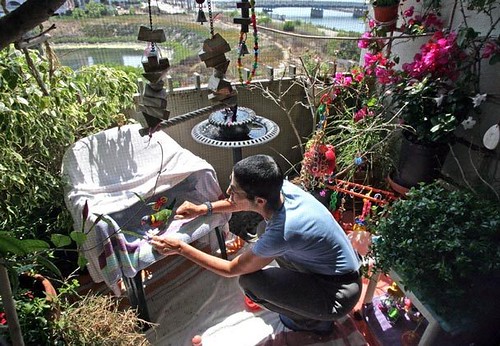 Mira Tweti has sacrificed much of her two-bedroom apartment on Los Angeles' west side to ZaZu, fashioning a mini-rain-forest-cum-bird-playground on her spacious balcony and draping the living-room sofa in towels, since ZaZu poops as frequently as he flies. Photo: ANNE CUSACK
Mira Tweti has sacrificed much of her two-bedroom apartment on Los Angeles' west side to ZaZu, fashioning a mini-rain-forest-cum-bird-playground on her spacious balcony and draping the living-room sofa in towels, since ZaZu poops as frequently as he flies. Photo: ANNE CUSACK
LOS ANGELES — ZaZu hangs upside down on the curtains of the apartment window, surveying all that is his: the jumble of colorful plastic balls, the climbing ladders, the panoramic view of the ocean. And the woman standing before him, cooing.
"Whaddya say, cutie? Are you my sweetie?" she asks.
The 3-year-old rainbow lorikeet — a small parrot — is a mélange of colors.
His head is a deep cobalt blue, his torso a flame red with black stripes. His back and his sweeping tail — "keet" denotes "long-tailed" — are AstroTurf green.
ZaZu revs up for takeoff with a feathery whir that sounds like a toy helicopter and soars past his owner and out of the room.
Usually he follows her. "I'm the flock leader," said Mira Tweti, whose last name is pronounced "tweetie," an impossibly perfect coincidence for a bird owner. (It's Moroccan. She didn't make it up.)
ZaZu flies into the kitchen and perches atop the refrigerator, the better to dominate the two strangers visiting his nest.
"This is the closest he'll get to a tree," Tweti said.
A photographer moves in for a shot.
"Bye-bye," ZaZu says in a voice that sounds like a scratchy tape recording.
"No, no, they're not leaving," Tweti tells ZaZu.
Once, she was a cat person. Now Tweti is a bird person.
She has sacrificed much of her two-bedroom apartment on Los Angeles' west side to ZaZu, fashioning a mini-rain-forest-cum-bird-playground on her spacious balcony and draping the living-room sofa in towels, since ZaZu poops as frequently as he flies.
"It's like living with a 3-year old," Tweti said.
"Hello, hello," ZaZu says. "Goodbye."
Tweti, once a film publicist, has written extensively on bird and environmental issues. Her new book, "Of Parrots and People," offers a portrait of the avians that is alternately serious and quirky. ("Research on wild birds has shown that 30 percent of the time, birds fly for fun," she writes.) And it examines the often brutal practices of the parrot trade, legal and illegal.
Tweti also published this year "Here, There and Everywhere," an elaborately illustrated children's book about a rainbow lorikeet. The book is fictional, but it's filled with facts about parrots.
Of the roughly 350 species of parrots indigenous to the world's tropical zones, a few dozen are lorikeets, distinguished by their long, tapered tails. Lorikeets such as ZaZu live about two decades, sometimes longer. Some African grays and Amazons can live into their 70s. Macaws and cockatoos have been known to live beyond 80.
Tweti's devotion to parrots has led her to a "Born Free" paradox: The pet she loves is a wild animal and shouldn't be a pet at all, she said. "It's like putting a human being in solitary confinement," said Tweti, who adopted ZaZu from a family that was giving him away.
Parrot owners who no longer can handle the energetic, vocal creatures typically ditch them, filling bird sanctuaries that have sprung up across the country, Tweti said.
Or they "free" them, which explains, at least in Southern California, why it's possible to see flocks of wild parrots cavorting in various neighborhoods.
She said parrots are the "fastest-growing unwanted pet," an assertion other bird-welfare advocates can't prove but suspect is accurate.
Tweti, who has helped place 53 parrots in zoos and sanctuaries in the past three years, said that if people insist on having a parrot, they should adopt from a rescue group, shelter or other owner.
Richard Farinato, senior adviser on sanctuaries and captive wildlife to the Humane Society of the United States, agreed, saying, "Don't ever buy a bird from a store. You're supporting a trade you probably don't want to know about."
Most pet parrots have been bred domestically, often under stressful conditions. Breeding parrots may live in dark, sterile cages, without enriching toys and baths, and their hatchlings are yanked away to be fed by plastic syringes. Although it's illegal, an unknown number of wild parrots are smuggled into the United States every year, mostly through Mexico.
A glass wall and a balcony run the length of Tweti's and ZaZu's apartment. A third of the balcony has been netted and is an aviary, full of amusements. When she has a dinner party, she puts ZaZu to bed in his sleeping cage before guests arrive.
"But more often than not, guests will say, 'Can ZaZu come out?' And I say, 'Yes, but he's going to poop on you,' " she said. Her guests insist, and she hands out "poop jackets" — old flannel shirts — for cover.